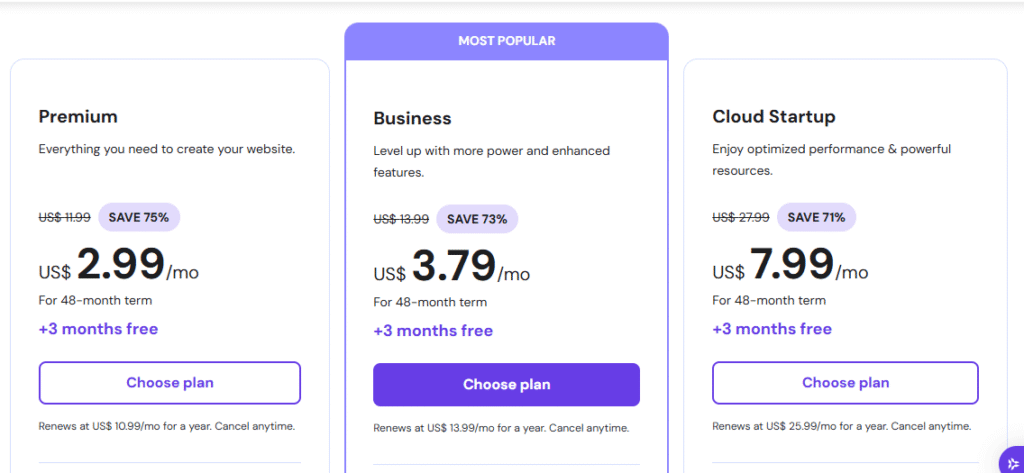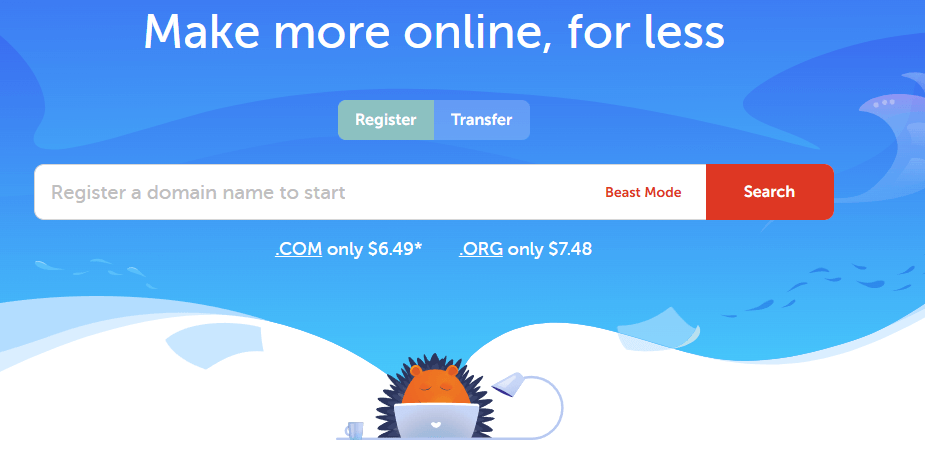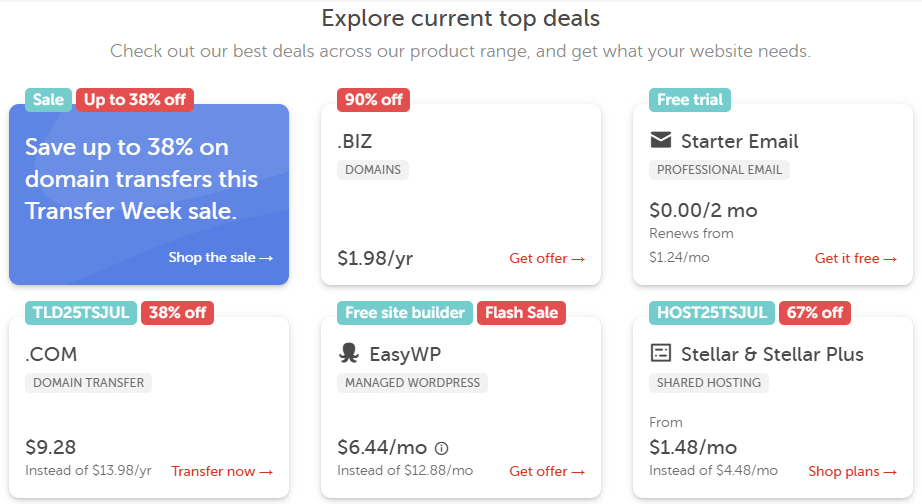Hostinger vs Namecheap are two of the most critical choices when selecting a web hosting provider for your online presence in 2025. Both have emerged as top contenders, offering budget-friendly yet feature-rich hosting solutions, from domain registration to robust hosting plans. This detailed comparison breaks down their pricing, performance, features, ease of use, and customer support—helping you make an informed decision based on your specific needs. We’ll analyze their strengths and weaknesses using the latest market trends and real-world testing.
Quick Verdict
For those prioritizing cutting-edge performance, a modern user interface, and comprehensive AI-powered tools, Hostinger generally offers superior value, especially for beginners and small to medium-sized businesses. If your primary need is affordable domain registration with reliable shared hosting and a familiar cPanel environment, Namecheap remains a strong and cost-effective choice, particularly for users managing multiple domains or seeking robust privacy features. Ultimately, the best choice depends on your specific priorities and technical comfort level.

Table of Contents
Pricing and Plans: Unpacking the Costs and Value
When evaluating web hosting providers, pricing is often the first consideration for many users. Both Hostinger and Namecheap are renowned for their affordability, but a deeper dive reveals nuances in their pricing structures, renewal rates, and the value offered within each plan. Understanding these differences is crucial for long-term cost-effectiveness and ensuring you get the most out of your investment.
Hostinger’s Pricing Philosophy
Hostinger has consistently positioned itself as a highly affordable hosting solution, particularly for those willing to commit to longer-term plans. Their pricing model often features significantly discounted introductory rates for multi-year subscriptions, typically 48 months, which unlock their lowest advertised prices [1, 3]. While this requires a larger upfront payment, the monthly equivalent cost can be remarkably low, making it an attractive option for budget-conscious users planning for the long haul.
For instance, Hostinger’s shared hosting plans, such as the Premium and Business plans, come with a range of features that often exceed what competitors offer at similar price points.
The Premium plan, for example, includes
- Hosting for up to 25 websites
- 25 GB SSD storage
- Unlimited bandwidth
- A free domain for the first year
- Free SSL certificates
- Weekly backups
The Business plan upgrades this to
- 50 websites, 50 GB
- NVMe storage
- Daily backups
- Advanced WordPress acceleration
- A free CDN
The Cloud Startup plan further boosts resources with
- 100 websites
- 100 GB NVMe storage

Key takeaways for Hostinger pricing:
- Long-term commitment for best rates: Deep discounts are tied to 48-month plans.
- Value-packed plans: Even entry-level plans offer substantial features like free domains, SSLs, and ample resources.
- NVMe storage: Available on higher-tier plans, offering superior performance compared to traditional SSDs .
- Clear renewal rates: While introductory prices are low, it’s important to note the renewal rates, which are typically higher after the initial term .

Namecheap’s Pricing Philosophy
Namecheap, originally a domain registrar, has expanded its hosting services with a focus on competitive pricing and transparency, particularly regarding domain renewals. Their shared hosting plans often appear cheaper at first glance, with introductory rates that can be lower than Hostinger’s for shorter terms, such as 2-year plans , . However, the value proposition shifts when considering the features included and the renewal costs.
Namecheap’s shared hosting plans, like Stellar, Stellar Plus, and Stellar Business, offer varying levels of resources.

The Stellar plan typically includes
- 20 GB SSD storage
- Allows for 3 websites
Stellar Plus offers
- Unmetered SSD storage
- unlimited websites
Namecheap also provides managed WordPress hosting through their EasyWP plans, which are designed for simplicity and performance for WordPress users
Key takeaways for Namecheap pricing:
- Attractive short-term rates: Often lower initial costs for 1-2 year commitments.
- Domain-centric value: Strong reputation for affordable domain registration and free WHOIS privacy protection.
- cPanel interface: A familiar control panel for many users, though some find it less modern than Hostinger’s hPanel .
- SSL limitations: Shared hosting plans typically include a free SSL for only the first year, requiring purchase thereafter.
- Traffic limits on CDN: Their Supersonic CDN has traffic limits, unlike Hostinger’s CDN .
Price Comparison Table
To provide a clearer picture, here’s a comparative overview of typical starting prices and key inclusions for both providers (Note: Prices are subject to change and often depend on promotional offers and subscription duration):
| Feature/Plan | Hostinger (Typical Introductory) | Namecheap (Typical Introductory) |
| Shared Hosting (Entry-Level) | ~$2.99/month (48-month term) | ~$1.88/month (24-month term) |
| Managed WordPress (Entry-Level) | ~$3.79/month (48-month term) | ~$24.88/year (EasyWP Starter) |
| Free Domain | Yes (with annual plans, for 1st year) | Yes (with annual plans, limited TLDs) |
| Free SSL | Unlimited, lifetime | 1st year free on shared, then paid |
| Storage Type | SSD/NVMe | SSD |
| Control Panel | hPanel | cPanel |
| Backups | Weekly (daily on Business/Cloud) | Daily (most plans, except Stellar) |
| CDN | Free Hostinger CDN (Business/Cloud) | Supersonic CDN (with traffic limits) |
Verdict on Pricing: While Namecheap often boasts lower initial prices for shorter terms, Hostinger generally offers more comprehensive features and better value, especially when committing to their longer-term plans. The inclusion of NVMe storage, a more advanced CDN, and lifetime free SSLs on Hostinger’s higher-tier plans often outweighs Namecheap’s initial price advantage, particularly for growing websites. For domain registration, Namecheap remains a top choice due to its competitive pricing and robust privacy features.
Performance and Uptime: Speed, Reliability, and Global Reach
In the world of web hosting, performance and uptime are paramount. A fast-loading website not only improves user experience but also positively impacts SEO rankings. Similarly, consistent uptime ensures your website is always accessible to your audience. Both Hostinger and Namecheap strive for high performance, but their underlying technologies and infrastructure lead to notable differences.
Hostinger’s Performance Edge
Hostinger has made significant investments in its infrastructure to deliver impressive speed and reliability. A key factor in their performance is the use of LiteSpeed servers across their hosting environment. LiteSpeed Web Server is known for its superior performance compared to traditional Apache servers, especially in handling high traffic and dynamic content like WordPress sites. This, combined with NVMe SSD storage on their Business and Cloud Startup plans, contributes to rapid page loading times and lower response times . NVMe (Non-Volatile Memory Express) technology offers significantly faster data transfer speeds than traditional SSDs, directly impacting website performance.
Hostinger also boasts a global network of 12 data centers strategically located across the US (Arizona, New York, Massachusetts), Brazil, France, Germany, Lithuania, the UK, the Netherlands, India, and Indonesia . This extensive network allows users to choose a server location closest to their target audience, further reducing latency and improving loading speeds. Their integrated Content Delivery Network (CDN), included with Business plans and up, caches website content and delivers it from the nearest server to the visitor, further enhancing speed and user experience .
Hostinger consistently exceeds its 99.9% uptime guarantee, with many reports indicating near-perfect uptime records . This commitment to reliability ensures that your website remains online and accessible around the clock.
Key takeaways for Hostinger performance:
- LiteSpeed Servers: For faster processing and handling of website requests.
- NVMe SSDs: Superior storage technology for quicker data access.
- Global Data Centers: 12 locations for optimized latency and regional targeting.
- Integrated CDN: For accelerated content delivery.
- Excellent Uptime: Consistently meets or exceeds 99.9% guarantee.

Namecheap’s Performance Overview
Namecheap provides reliable performance, though it generally lags behind Hostinger in raw speed tests, particularly during peak traffic periods [3]. Namecheap primarily utilizes Apache servers for its shared hosting, which, while stable and widely used, are not as performant as LiteSpeed servers . They do use SSD storage across their hosting services, which is a significant improvement over traditional HDDs, contributing to decent loading speeds .
Namecheap has a more limited network of 4 data centers located in Arizona (US), Singapore, Amsterdam, and the UK . While these locations cover major regions, they offer less flexibility for global targeting compared to Hostinger’s broader network. Namecheap also offers a Supersonic CDN, which provides security features like DDoS protection and custom SSL. However, a notable limitation is its traffic limit of 50 GB per month, unlike Hostinger’s unlimited CDN usage on applicable plans . Exceeding this limit would require purchasing additional CDN services.
Namecheap also offers a 99.9% uptime guarantee, and generally delivers on this promise, providing a stable hosting environment for most users .
Key takeaways for Namecheap performance
- Apache Servers: Standard and reliable, but less performant than LiteSpeed.
- SSD Storage: Good for general performance, but not NVMe.
- Limited Data Centers: Fewer options for global audience targeting.
- Supersonic CDN with Traffic Limits: May incur additional costs for high-traffic sites.
- Reliable Uptime: Meets its 99.9% guarantee.

Verdict on Performance: Hostinger clearly takes the lead in performance due to its adoption of LiteSpeed servers, NVMe storage, and a more extensive global data center network. These technologies provide a noticeable advantage in website loading speeds and overall responsiveness, making Hostinger a better choice for performance-critical websites. While Namecheap offers solid and reliable performance for most standard websites, it may not be the optimal choice for those demanding the absolute fastest speeds or catering to a highly global audience without additional CDN investment.
Features: A Deep Dive into What Each Provider Offers
Beyond pricing and raw performance, the suite of features offered by a web host significantly impacts your ability to build, manage, and grow your online presence. Both Hostinger and Namecheap provide a comprehensive set of tools, but their approaches and the depth of their offerings vary.
Hostinger’s Feature-Rich Ecosystem
Hostinger distinguishes itself with a modern, feature-rich ecosystem designed to cater to both beginners and experienced users. A standout feature is their proprietary control panel, hPanel . Unlike the industry-standard cPanel, hPanel is custom-built, offering a clean, intuitive, and highly responsive interface. Users often praise its ease of use, making website management, domain configuration, and email setup straightforward, even for those new to web hosting .
For website creation, Hostinger offers a powerful AI Website Builder that simplifies the process of designing and launching a site. This builder, coupled with Hostinger Horizons, an AI-powered partner, allows for rapid project preview generation and even enables users to build, edit, and publish custom web applications without writing a single line of code . This focus on AI-driven tools makes Hostinger particularly appealing for individuals and small businesses looking for an accessible entry point into web development.
WordPress Optimization is another strong suit for Hostinger. Their managed WordPress services include an auto-updater, a staging tool for testing changes before going live, and one-click plugin and theme management directly through hPanel . This streamlines the WordPress workflow, making it easier to maintain and develop WordPress sites.
Other notable features include:
- Free Domain: Included with most annual hosting plans for the first year .
- Free SSL Certificates: Unlimited and lifetime SSLs are provided on all plans, ensuring secure connections for your website visitors .
- Email Accounts: Varying numbers of free mailboxes per website, typically for one year .
- Automatic Website Migration: Hostinger offers free migration services, simplifying the process of moving an existing website to their platform.
- Backups: Weekly backups are standard, with daily backups available on Business and Cloud Startup plans
- AI SEO Ready: Tools and features designed to help with search engine optimization .
Explore Hostinger’s AI-powered tools for easy website creation.
Namecheap’s Feature Set
Namecheap, while offering a robust set of features, often adheres to more traditional hosting paradigms. Their primary control panel is cPanel, which is an industry standard and familiar to many web developers and administrators . While functional and feature-rich, some users might find its interface less modern and intuitive compared to Hostinger’s hPanel .
As a prominent domain registrar, Namecheap excels in domain management and related services. They offer competitive pricing for domain registrations and renewals, along with free WHOIS privacy protection for life, a significant benefit for users concerned about personal information exposure.
For WordPress users, Namecheap provides EasyWP plans, which are managed WordPress hosting solutions. These plans offer features like SSD storage, integrated CDN, and cloud-based scalability. However, some advanced WordPress management features, such as integrated staging environments, might require manual setup or external plugins, unlike Hostinger’s more integrated approach.
Other notable features include:
- Free Domain: Included with some annual hosting plans, though with limited TLD (Top-Level Domain) options compared to Hostinger .
- Free SSL Certificates: Typically included for the first year on shared hosting plans, but subsequent years require purchase.
- Email Accounts: Provided with hosting plans.
- Daily Backups: Available on most plans, which is a strong point for Namecheap, as Hostinger only offers daily backups on higher-tier plans [3].
- Supersonic CDN: Offers security features like DDoS protection, but comes with a traffic limit of 50 GB per month, which could be a concern for high-traffic websites .
- Premium DNS: Available for faster DNS resolution .
Feature Comparison Table
| Feature | Hostinger | Namecheap |
| Control Panel | hPanel (Custom) | cPanel (Industry Standard) |
| Website Builder | AI Website Builder, Hostinger Horizons | Basic Website Builder |
| Managed WordPress | Integrated staging, auto-updates, 1-click management | EasyWP (managed), Softaculous for installs, less integrated staging |
| Free WHOIS Privacy | No (usually separate purchase) | Yes (lifetime with domain) |
| Free SSL | Unlimited, lifetime | 1st year free on shared, then paid |
| CDN | Free Hostinger CDN (unlimited on applicable plans) | Supersonic CDN (50 GB/month limit) |
| Storage Type | SSD/NVMe | SSD |
| Backups | Weekly (daily on Business/Cloud) | Daily (most plans, except Stellar) |
| AI Tools | Extensive (Horizons, AI Builder, AI SEO) | Limited/None specific to hosting |
Verdict on Features: Hostinger generally offers a more modern and integrated feature set, particularly with its hPanel and advanced AI-powered website building and management tools. Its lifetime free SSLs and unlimited CDN on higher plans also provide significant long-term value. Namecheap, while strong in domain management and offering the familiar cPanel, may require additional purchases for features like ongoing SSLs and unmetered CDN usage. For users prioritizing ease of use, cutting-edge tools, and comprehensive WordPress management, Hostinger often presents a more compelling package. For those with extensive domain portfolios or a preference for cPanel, Namecheap remains a solid choice.
Customer Support: Getting Help When You Need It
The quality and accessibility of customer support can significantly impact your hosting experience, especially when technical issues arise. Both Hostinger and Namecheap offer 24/7 support, but their channels and response times can differ.
Hostinger’s Support Approach
Hostinger prides itself on its responsive and multilingual customer support. They offer 24/7 live chat and email support . Users frequently report fast response times, with an average response time of under 3 minutes for live chat . The support team is known for being knowledgeable and helpful, and they offer assistance in over 8 languages, which is a significant advantage for a global user base . While Hostinger does not offer phone support, their efficient live chat system often negates the need for it.
Key takeaways for Hostinger support:
- 24/7 Live Chat & Email: Constant availability for assistance.
- Fast Response Times: Quick resolution of queries.
- Multilingual Support: Catering to a diverse international audience.
- Knowledgeable Staff: Capable of handling a wide range of technical issues.
Namecheap’s Support Approach
Namecheap also provides 24/7 live chat and email ticketing support [3]. Their live chat response times are generally good, typically within 2-3 minutes [3]. However, a notable difference is that Namecheap’s support is primarily English-only, which might be a limitation for non-English speaking users [3]. While their support team is generally helpful for common issues, some users have reported that complex technical problems might require more back-and-forth communication.
Key takeaways for Namecheap support:
- 24/7 Live Chat & Email: Consistent availability.
- Good Response Times: Generally quick for live chat.
- English-Only Support: May not be ideal for all international users.
- Ticket System: For more complex or detailed inquiries.
Verdict on Customer Support: Both providers offer reliable 24/7 support through live chat and email. Hostinger gains an edge with its multilingual support and consistently reported faster live chat response times. For users who prefer phone support, neither Hostinger nor Namecheap are ideal, but Hostinger’s efficient live chat often makes up for it. For non-English speakers, Hostinger is the clear winner.
Ease of Use: Navigating Your Hosting Environment
The user experience, particularly the ease with which you can manage your website and hosting settings, is a crucial factor, especially for beginners. Both Hostinger and Namecheap offer interfaces designed to simplify web hosting, but they approach this differently.
Hostinger: The Intuitive hPanel Experience
Hostinger’s commitment to user-friendliness is most evident in its custom-built control panel, hPanel. Designed from the ground up to be intuitive and modern, hPanel offers a clean, minimalist interface that is easy to navigate, even for those with no prior hosting experience. All essential functions, from domain management and email setup to file management and database creation, are logically organized and easily accessible.
The visual appeal and responsiveness of hPanel contribute significantly to a smooth user experience. Tasks that might seem daunting in other control panels are simplified through clear menus and straightforward workflows. This makes Hostinger an excellent choice for beginners, small business owners, and anyone who prefers a streamlined, modern interface for managing their online presence. The integration of their AI Website Builder and other AI tools directly within hPanel further enhances this ease of use, allowing for seamless website creation and management.
Key takeaways for Hostinger ease of use:
- Custom hPanel: Modern, clean, and highly intuitive interface.
- Beginner-Friendly: Designed for ease of navigation and management.
- Streamlined Workflows: Simplifies complex hosting tasks.
- Integrated AI Tools: Enhances website creation and management.
Namecheap: The Familiar cPanel Environment
Namecheap, on the other hand, relies on the widely recognized cPanel for its shared hosting services . cPanel is an industry-standard control panel that has been around for many years. Its familiarity is a significant advantage for users who have previous experience with web hosting, as they will likely find its layout and functionalities instantly recognizable .
cPanel is feature-rich and provides extensive control over various aspects of your hosting environment, including file management, databases, email accounts, and security settings. However, its interface, while comprehensive, can sometimes feel a bit dated and cluttered compared to the more modern designs of custom panels like hPanel . For new users, the sheer number of options and icons in cPanel might present a steeper learning curve.
Namecheap’s EasyWP managed WordPress plans do come with a proprietary panel that is more simplified than cPanel, aiming to provide a more tailored experience for WordPress users . However, for their general shared hosting, cPanel remains the primary interface.
Key takeaways for Namecheap ease of use:
- Industry-Standard cPanel: Familiar to experienced users.
- Feature-Rich: Offers extensive control over hosting settings.
- Potential Learning Curve: Can be overwhelming for absolute beginners.
- EasyWP Custom Panel: A more simplified interface for managed WordPress.
Verdict on Ease of Use: Hostinger clearly wins in terms of overall ease of use, especially for beginners, thanks to its modern, intuitive hPanel. Its custom design and integrated AI tools make managing a website a much smoother experience. Namecheap’s reliance on cPanel, while familiar to many, can be less user-friendly for newcomers. However, for those already accustomed to cPanel, Namecheap offers a comfortable and comprehensive environment.
Conclusion: Which Web Host Should You Choose in 2025?
Deciding between Hostinger and Namecheap ultimately comes down to your specific needs, priorities, and budget. Both providers offer compelling services, but they excel in different areas, making them suitable for different types of users.
Choose Hostinger if:
- You prioritize cutting-edge performance and speed: With LiteSpeed servers, NVMe storage, and a global network of data centers, Hostinger delivers superior loading times and responsiveness.
- You are a beginner or prefer a modern, intuitive interface: Hostinger’s custom hPanel is exceptionally user-friendly, making website management straightforward for all skill levels .
- You want comprehensive AI-powered tools: Features like the AI Website Builder and Hostinger Horizons streamline website creation and management .
- You need extensive WordPress optimization: Hostinger offers integrated staging, auto-updates, and 1-click management for WordPress sites.
- You value long-term savings on hosting: While requiring a longer commitment, Hostinger’s multi-year plans offer some of the lowest effective monthly rates .
- You require multilingual customer support: Hostinger’s 24/7 live chat is available in over 8 languages [1].
Choose Namecheap if:
- Your primary need is affordable domain registration and management: Namecheap’s roots as a domain registrar mean competitive pricing and excellent domain-related services, including free WHOIS privacy.
- You prefer the traditional cPanel interface: If you’re already familiar and comfortable with cPanel, Namecheap offers a consistent experience .
- You manage multiple domains or are a reseller: Namecheap’s domain management tools and reseller hosting options are robust.
- You need daily backups on shared plans: Namecheap offers daily backups on most of its shared hosting plans, which is a strong advantage.
- You are on a very tight budget for short-term hosting: Namecheap can sometimes offer lower introductory rates for shorter commitments.
Final Verdict: For most users in 2025, especially those building new websites or looking for a performance upgrade, Hostinger emerges as the stronger contender due to its superior technology, modern user experience, and advanced AI tools. However, Namecheap remains an excellent choice for domain-centric users and those who prefer the familiarity of cPanel, offering reliable services at competitive prices.
Frequently Asked Questions (FAQs)
Here are answers to some common questions that arise when comparing Hostinger and Namecheap:
Is Hostinger better or Namecheap?
This depends on your specific needs. Hostinger generally offers better performance, a more modern user interface (hPanel), and advanced AI tools. Namecheap excels in domain management, offers the familiar cPanel, and can be slightly cheaper for short-term commitments. For overall value and performance, Hostinger often has an edge, especially for new websites and those seeking cutting-edge features.
Is there anything better than Hostinger?
While Hostinger is a top-tier provider,
there are other excellent hosting providers that might be
better suited for very specific, high-end needs (e.g., enterprise-level hosting, dedicated servers with extreme customization). However, for the vast majority of small to medium-sized websites, Hostinger offers an exceptional balance of price, performance, and features that is hard to beat.
What is the disadvantage of Hostinger?
One primary disadvantage of Hostinger is that its lowest prices require a long-term commitment (typically 48 months), which means a larger upfront payment. While this offers significant savings in the long run, it might not be ideal for those looking for short-term flexibility. Additionally, while their live chat support is excellent and multilingual, they do not offer phone support, which some users might prefer for immediate assistance .
What are the disadvantages of Namecheap?
Namecheap’s disadvantages include its reliance on cPanel, which can feel less modern and intuitive compared to Hostinger’s hPanel for new users . Their free SSL certificates on shared hosting are only for the first year, requiring a purchase for subsequent years . The Supersonic CDN also has a traffic limit, which could be a drawback for high-traffic websites . Furthermore, their customer support is primarily English-only, which might be a barrier for international users [3]. Finally, their performance, while reliable, generally lags behind Hostinger in raw speed tests.

